
The foreign relations of North Macedonia since its independence in 1991 have been characterized by the country's efforts to gain membership in international organizations such as NATO and the European Union and to gain international recognition under its previous constitutional name, overshadowed by a long-standing, dead-locked dispute with neighboring Greece. Greek objections to the country's name had led to it being admitted to the United Nations and several other international fora only under the provisional designation Former Yugoslav Republic of Macedonia until its official and erga omnes renaming to North Macedonia, a name under which it is now universally recognised.

Former President Zine El Abidine Ben Ali has maintained Tunisia's long-time policy of seeking good relations with the West, while playing an active role in Arab and African regional bodies. President Habib Bourguiba took a nonaligned stance but emphasized close relations with Europe, Pakistan, and the United States.
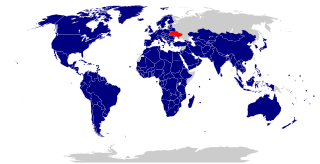
Ukraine has formal relations with many nations and in recent decades has been establishing diplomatic relations with an expanding circle of nations. The foreign relations of Ukraine are guided by a number of key priorities outlined in the foreign policy of Ukraine.
Superpower describes a state or supranational union that holds a dominant position characterized by the ability to exert influence or project power on a global scale. This is done through the combined means of economic, military, technological, political, and cultural strength as well as diplomatic and soft power influence. Traditionally, superpowers are preeminent among the great powers. While a great power state is capable of exerting its influence globally, superpowers are states so influential that no significant action can be taken by the global community without first considering the positions of the superpowers on the issue.
The Five Principles of Peaceful Coexistence are the Chinese government's foreign relations principles first mentioned in the 1954 Sino-Indian Agreement. Also known as Panchsheel, these principles were subsequently adopted in a number of resolutions and statements, including the preamble to the Constitution of the People's Republic of China.

The Asia–Europe Meeting (ASEM) is an Asian–European political dialogue forum to enhance relations and various forms of cooperation between its partners. It was officially established on 1 March 1996 at the 1st ASEM Summit (ASEM1) in Bangkok, Thailand, by the then 15 Member States of the European Union (EU) and the European Commission, the then 7 Member States of the Association of Southeast Asian Nations (ASEAN), and the individual countries of China, Japan, and South Korea. A series of enlargements saw additional EU Member States join as well as India, Mongolia, Pakistan and the ASEAN Secretariat in 2008, Australia, New Zealand and Russia in 2010, Bangladesh, Norway, and Switzerland in 2012, as well as Croatia, and Kazakhstan in 2014.

Relations between the European Union (EU) and the People's Republic of China (PRC) or Sino–European relations are bilateral relations that were established in 1975 between the PRC and the European Community. The EU is the PRC's largest trading partner, and the PRC is the EU's largest trade partner.

People's Republic of China has an embassy in Athens. The Hellenic Republic has an embassy in Beijing and three general consulates in Guangzhou, Hong-Kong and since 2005 in Shanghai. The Port of Piraeus is important from a geostrategic view for China, as it helps China's transactions with the whole of Europe. Thousands of Chinese people are living in Greece in the Overseas Chinese context and approximately 1000 Greek citizens are living in China. Modern diplomatic relations between the two countries were established in 1972. Today, Greece and China enjoy a very good relationship based on a solid foundation, which continues to be growing steadily.

The Republic of Bulgaria is a country in Southeast Europe, and a member of both NATO and the European Union. It maintains diplomatic relations with 183 countries.
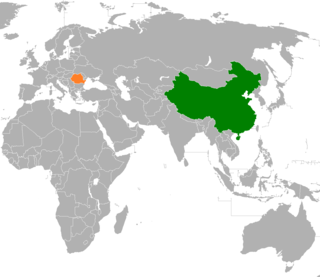
The Kingdom of Romania and Republic of China (ROC) began relations on July 5, 1939.

Foreign relations exist between Armenia and Bulgaria. Both countries have had diplomatic relations since they were established in 1992. Armenia has an embassy in Sofia; since December 19, 1999, Bulgaria has an embassy in Yerevan. Both countries are full members of the Organization of the Black Sea Economic Cooperation and the Council of Europe.
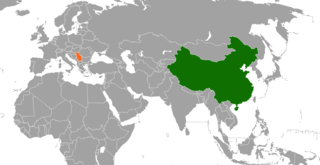
China-Serbian relations are foreign relations between the People's Republic of China and the Republic of Serbia. Relations have been maintained since SFR Yugoslavia's recognition of PR China on October 1, 1949, while diplomatic relations between the two countries were formally established by the exchange of diplomatic notes between the two Foreign Ministers on January 2, 1955. China has an embassy in Belgrade and also maintains an office in Priština based on consent of the Government of Serbia from November 2006. Serbia has an embassy in Beijing and a consulate-general in Shanghai. In 2017, Serbia and China mutually abolished the requirement of obtaining an entry visa for its citizens.
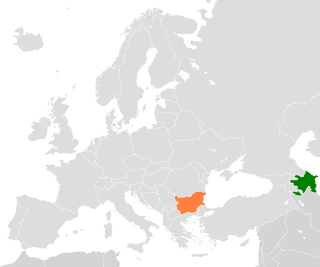
Bilateral relations exist between the Republic of Azerbaijan and the Republic of Bulgaria in political, socio-economic, cultural and other spheres. Cooperation is carried out in such areas as transport and transit of goods, tourism, pharmaceuticals, agriculture, science and high technologies, education, military equipment, etc.

China and Croatia established diplomatic relations on May 13, 1992. Croatia has an embassy in Beijing and a general consulate in Hong Kong. China has an embassy and a Confucius Institute in Zagreb.

Diplomatic relations between the Republic of Azerbaijan and the People's Republic of China were established on April 2, 1992. The relations between the two countries have developed smoothly and high-level exchanges have been close. The PRC embassy in Baku openly commends Azerbaijan for supporting its stance on the political status of Taiwan, Tibet's sovereignty, the conflict in Xinjiang, and the suppression of Falun Gong. All political forces have actively advocated strengthening friendly cooperation with China. China was one of the first countries to recognize independence. President Aliyev came to China in August 2008 and May 2014 to attend the opening ceremony of the Beijing Olympic Games and the fourth summit of the Asia Cooperation and Confidence Measures Conference. In March 2005 and December 2015, he twice went to China for state affairs. access. In June 2018, the President of the National Assembly, Assador, visited China. In May 2016, Special Envoy of Chinese Communist Party (CCP) general secretary Xi Jinping, member of the Political Bureau of the CCP Central Committee and Secretary of the CCP Central Political and Legal Affairs Commission Meng Jianzhu visited Afghanistan. In June of the same year, Zhang Gaoli, member of the Standing Committee of the Political Bureau of the CCP Central Committee and Vice Premier of the State Council, visited Azerbaijan.

Diplomatic relations between the People's Republic of China and Georgia were established on 9 June 1992. Since then, bilateral ties have advanced gradually and mostly focused on economic cooperation. China has an embassy in Tbilisi, and Georgia has an embassy in Beijing. By 2017, China had become Georgia's fourth largest trading partner and the second largest exporting market for Georgian wine. China has been appreciative of Georgia's commitment to One-China policy and has in turn respected Georgia's territorial integrity by refusing to recognize the Russian-backed separatist regions of Abkhazia and South Ossetia. Georgia, for its part, has been increasingly attractive for China as a transportation hub and one of the shortest routes for Chinese goods on their way to the European Union.

Cooperation between China and Central and Eastern European Countries is an initiative by the Chinese Ministry of Foreign Affairs to promote business and investment relations between China and 14 countries of Central and Eastern Europe : Albania, Bosnia and Herzegovina, Bulgaria, Croatia, the Czech Republic, Greece, Hungary, Montenegro, North Macedonia, Poland, Romania, Serbia, Slovakia, and Slovenia. Prior to their 2022 withdrawal, Estonia, Latvia, and Lithuania were members of the initiative.
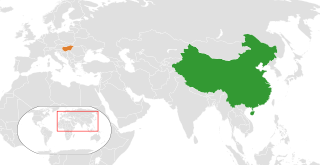
China–Hungary relations refers to the bilateral relations between China and Hungary. Relations have been generally positive, especially under Hungarian prime minister Viktor Orbán. China has an embassy in Budapest. Hungary has an embassy in Beijing and consulates-general in Chongqing, Guangzhou, Hong Kong and Shanghai.

















